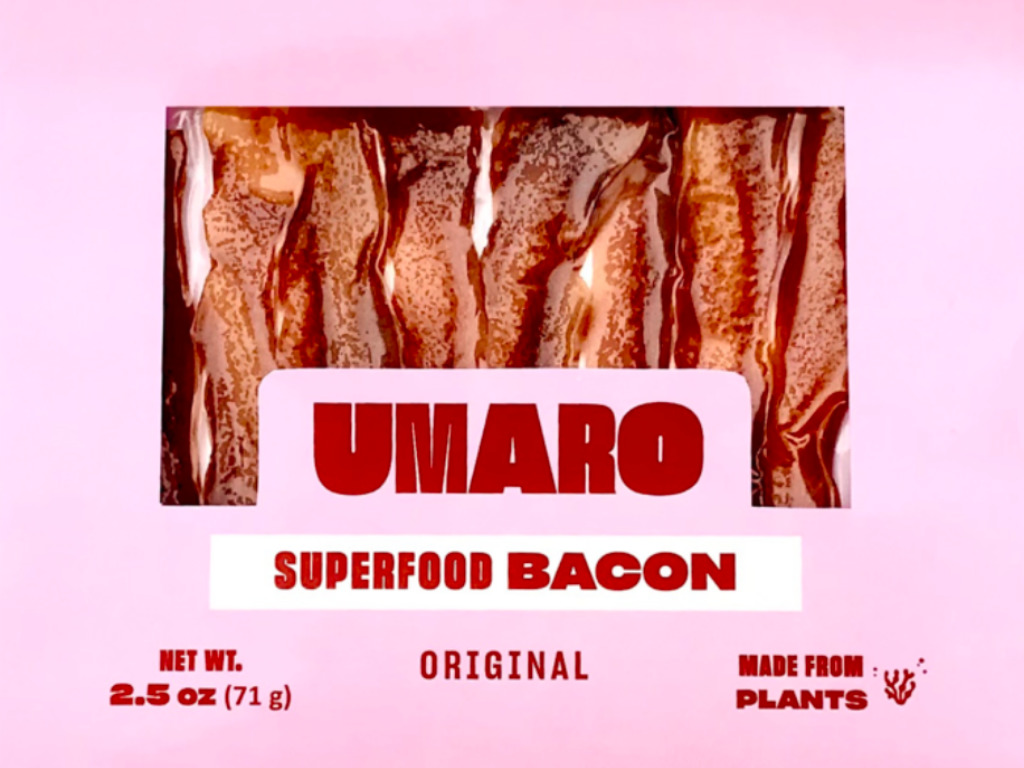4 Mins Read
Californian startup Umaro Foods, formerly Trophic, has announced the completion of a $3 million seed round led by AgFunder to support the launch of its first product, plant-based bacon made from seaweed protein.
Umaro has developed proprietary, undisclosed, technology to convert seaweed from ‘plant to protein’. The result is a red-coloured protein ingredient that is claimed to be highly nutritious and sustainable. Initial distribution of Umaro’s seaweed-powered bacon is slated for Q2 of this year, with restaurant partners being the first to trial the product.
Also participating in the seed round was Alexandria Venture Investments, Impact Science Ventures, Ponderosa Ventures, Clear Current Capital, Ahimsa Foundation, and Sustainable Food Ventures.

Chasing the ultimate prize
Umaro is the latest company to take on the challenge of perfecting plant-based bacon. Despite the stiff competition, founders Beth Zotter and Dr Amanda Stiles are not daunted. “Bacon is the holy grail of plant-based food, and our innovative formula is a game-changer in the category,” Zotter said in a statement.
The formula is composed of two interconnected developments. The first is the in-house-extracted Umaro protein, taken from red seaweed varieties to functionally replace heme. The second is an encapsulation process that traps plant-based oils into the bacon strips, which crisp up authentically when cooked. The result, according to Umaro, is a realistic alternative to bacon that crosses over into the superfoods category.
“Consumers can get excited about eating something that tastes, smells, and performs just like bacon, and we have the first plant-based product with the ability to take market share from animal bacon,” Zotter commented.

Pinning hopes on seaweed
Working exclusively with ocean-farmed seaweed varieties, Umaro has come full circle. In its former incarnation, the company sought to design offshore seaweed farming systems for what it considered to be the future of sustainable protein sourcing. Now, it has embraced the role of protagonist, seeking to, eventually, create a range of branded seaweed protein-based products.
“Seaweed offers the most sustainable, lowest-impact way to source protein, and the ocean is our biggest protein bioreactor,” Zotter said in a statement. “It requires no land, no freshwater, and no synthetic fertilizers. In the future, seaweed will supply the majority of our protein needs.”
Headquartered in the San Francisco Bay Area, Umaro has initiated strategic partnerships further afield, to progress seaweed farming, Building out foundational technology that will support the sustainable use of ocean-harvested seaweed, the company is working with the University of New Hampshire and Otherlab to improve first-gen offshore farming tech located in the Gulf of Maine.

The lure of plant-based bacon
Plant-based meat companies appear to fall into two categories: those that are determined to bring out the most realistic bacon analogue the world has seen and those who steer clear altogether. In recent months, a number of those looking to crack the code of pork-free rashers have announced developments.
In December last year, California’s Hooray Foods announced a $2.7million seed extension to assist with scaling its vegan bacon. Having sold more than two million rashers of its animal-free bacon, Hooray raised the funds to help improve its facilities and continue R&D, to perfect its flavour.
In 2022, the race really has started to heat up. La Vie, formerly 77 Foods, revealed it had closed a $28.3 million Series A round, led by VC fund Seventures and with vegan activist and actor Natalie Portman participating. The raise represented France’s largest-ever single round for an alternative protein company. The company claims that its non-GMO soy-based bacon is indiscernible from animal bacon in blind taste tests.
Over in Barcelona, Libre Foods is making headway with its mushroom-based bacon. Having secured $2.5 million in a seed round, the biotech startup is looking to scale its initial bacon offering. Using mushrooms in lieu of the originally proposed mycelium, the company states that once E.U. approval has been granted for the use of the fibrous root system, its bacon will be produced as initially planned. It is looking at the development of whole cut chicken and steak analogues alongside.
Lead photo by Umaro Foods.





